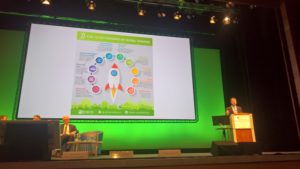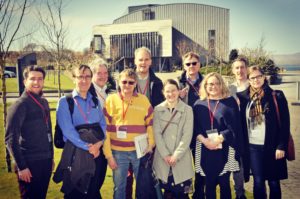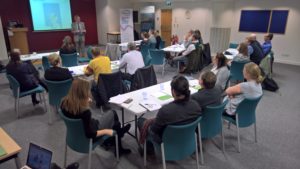 Between the 9th and 12th April, I had the opportunity to attend the 11th OECD Conference on Rural Development in Edinburgh. It was a stimulating and dynamic conference. I myself would probably not read a conference report on a blog, so in this post I’ll be brief and just summarize my main impressions.
Between the 9th and 12th April, I had the opportunity to attend the 11th OECD Conference on Rural Development in Edinburgh. It was a stimulating and dynamic conference. I myself would probably not read a conference report on a blog, so in this post I’ll be brief and just summarize my main impressions.
- “Rural areas are places of opportunities and are vital for inclusive growth“. This is the title of the “Policy Statement” endorsed by the Edinburgh conference. It anticipates the fact that the entire session was characterised by positive messages for more “enabling policy”, “necessary investment”, “empowerment of actors”, “integrated and territorial approaches”, “citizen participation”, etc. In my opinion, the conference got the message right.
- Also at the conference, 10 key global trends that have an influence on rural areas and communities were noted for the record (read them here). In my view, these are nothing more than a mixture of fashionable technological and well-known socio-demographic developments. However, as one participant rightly said during a session: “Change is brought about by people and communities, not by any gadgets“. I think that at some points the focus on “socio-psychological” aspects and the importance of changing human behaviour was missing.

- There are many good examples to illustrate that there is a lot of innovation going on in every conceivable area of product manufacturing and service delivery that is bringing us closer to a more sustainable economy. Rural actors also play a significant role in this. That’s a little bit of light at the end of the tunnel! Nevertheless, innovation does not come easily, as the LAG manager from the northernmost LEADER region in Europe (Lapland) stated: “People are afraid of failing; this social attitude stands in the way of innovations“.
- The perspective of the conference was, without doubt, very “western” orientated. This is has obviously to do with the “OECD-stance”, anyhow we have to acknowledge that many of the discussed trends are global. But, what immediate effect do the named innovations have on emerging and developing economies? And last but not least, will we be able to prevent the collapse scenario due to what already seems unstoppable climate change?
- In order to be able to offer prospects for the future to people in the countryside, opportunities and basic conditions for the development of local and regional economies must be created – and of course for much more than just agriculture and stock farming. It became very clear that there is much more potential in villages and rural areas than can be seen at first glance. It needs people and structures that deal with the space and communities, that bring together relevant stakeholders and perhaps slightly reorganize the available resources, focus on them in a new light or reconnect them completely to drive innovation.

- On this last point, rural entrepreneurs and start-up founders play an extremely important role. Due to the greater distances to the decision-making, knowledge and resource centres, they need support tailored to them and their space. Looked at strategically, the new rural economy needs steady, moderate growth. In the case of large settlements with unsustainable business models (e.g.: mere extraction of natural resources), jobs will be lost in 20 or 40 years at the latest. Small and medium-sized companies with a high degree of specialisation are the means to choose. And as one entrepreneur of high-tech algae energy production said, regarding having his roots in the region: “To me, money is not everything, but at the end of the day it’s the money that makes my business sustainable”.
- At the level of policy for rural areas – influencing this is one of the #OECDrural’s primary concerns – a relatively clear consensus emerged about the fact that establishing a so-called “neo-endogenous” approach is needed for sustained development. This approach can be found where politics and administration (ie: the top-down approach) meet “in the middle” with civil society organisations and with the private and voluntary sector (the bottom-up approach) to decide on policy for rural areas. This culture of participation arises through practice and from the realisation that this way makes more effective and inclusive development possible.
- A very personal insight from the impulses arising from the OECD meeting is that local and regional government in rural areas is probably one of the top three contingent factors for their development. This is what entrepreneurs and practitioners of rural and regional development reported several times in their contributions. We need a municipal administration with assertiveness, with qualified staff and with acceptable financial resources. How else are they going to be able to contribute to overcoming the enormous challenges in their sphere of influence? If these material foundations exist, we should all work to ensure that the administration not only manages but also proactively shapes it. The state should facilitate development through support and advice. However, the absence at the conference of representatives from this domain was clearly felt. I think it’s a pity, but I suspect that they did not perceive themselves as being clearly addressed by the conference anyway. This pointer applies in particular to the organisers of #OECDrural.
 On the last day of the conference, I was privileged to learn about a number of good examples of local and business development on an excursion to the “Scottish Marine Institute” in Oban on the Scottish west coast. This was organised by “Highlands and Islands Enterprise”, the Scottish government’s business development corporation for the remotest areas of Scotland. Even innovative high-tech companies in the life sciences sector – such as Xanthella Ltd or Cuantec Ltd – can settle in a remote location with some 8,000 inhabitants if the support is right and the endogenous potential of the region can be harnessed.
On the last day of the conference, I was privileged to learn about a number of good examples of local and business development on an excursion to the “Scottish Marine Institute” in Oban on the Scottish west coast. This was organised by “Highlands and Islands Enterprise”, the Scottish government’s business development corporation for the remotest areas of Scotland. Even innovative high-tech companies in the life sciences sector – such as Xanthella Ltd or Cuantec Ltd – can settle in a remote location with some 8,000 inhabitants if the support is right and the endogenous potential of the region can be harnessed.
All in all, a worthwhile visit to Edinburgh with a lot of new insights and contacts!





